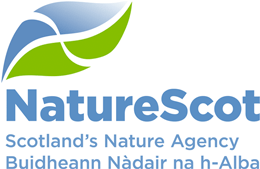18 September, 2015
In-stream restoration on the River Dee at Mar Lodge car bank
Improvements in the River Dee as part of a £3.5 million Pearls in Peril LIFE project to improve habitat for freshwater pearl mussels and salmon are set to go ahead the week of 21 September.
Up to 16 cars, tonnes of concrete waste, rocks and boulders will be removed from the bank of the River Dee to reduce the risk of pollution to the rare freshwater pearl mussel and to salmon.
In 1984 a 100m gap in the riverbank on the Mar Lodge Estate, now owned by the National Trust for Scotland, was filled with a range of materials including trees, old cars, and large quantities of concrete, rocks and boulders. There is now erosion around the car barrier and the facing is beginning to degrade. With its corrugated iron facing, this stretch of riverbank is an eyesore on the otherwise unspoiled landscape, clearly visible from the Linn O'Dee road.
David Frew, Property Manager for Mar Lodge Estate said: “The car embankment has been a blot on an otherwise iconic landscape for many years, and it will be fantastic to see this restoration work finally take place. The project demonstrates how partnership working between landowners and public agencies can deliver real results for the environment.”
The waste that makes up the car barrier will be removed from the riverbank and the cars taken away to a scrapyard. The bank will be re-profiled to a more natural shape to blend in with the surrounding landscape.
The car bank project was initiated by the Dee Catchment Partnership, and the work is now being carried out as part of the Pearls in Peril project (PIP), co-ordinated by Scottish Natural Heritage and working in partnership with the Dee District Salmon Fishery Board and the River Dee Trust. Susan Cooksley of the Dee Catchment Partnership said: “It’s been a real team effort over the last seven years to get to this stage. The Partnership is delighted that the works are going ahead through the PIP project and are looking forward to seeing this section of the upper Dee restored to a much more natural condition.”
On the Dee, work by PIP includes planting woodland along 70km of riverbank to protect against the effects of future climate change; installing 45km of buffer strips in the middle catchment to protect watercourses from soil and nutrient runoff; an education programme in local schools throughout the catchment; and removing unnatural structures from the river, including the 'car embankment'.
The PIP project will result in a wide range of environmental benefits for the whole river system by improving water quality and helping restore natural flow patterns.
Freshwater pearl mussels are rare molluscs that live in the gravel beds of clean rivers. They feed by filtering water and removing fine particles and so help to keep our rivers clean. The mussels are critically endangered and Scotland is one of their few remaining strongholds.
MEDIA QUERIES: Lorna Wilkie – Pearls in Peril Project Officer (Scotland) 07825 185178 lorna@rafts.org.uk
The Dee District Salmon Fishery Board is the statutory body responsible for the protection, preservation and development of salmon and sea trout fisheries in the Dee system. www.riverdee.org
The River Dee Trust is a community-based charitable company, registered in Scotland, No. SC028497. It was set up in 1998 and is tasked with the following aims and objectives:
- To improve our knowledge of the ecology and associated fish stocks of the River Dee so that practical improvements and restoration of the River and the wildlife it supports can be achieved.
- To deliver educational information to schools, organisations and individuals living in the North East of Scotland.
PIP – Pearls in Peril
PIP is a European funded project co-ordinated by Scottish Natural Heritage and aimed at improving and restoring habitat and conditions for salmon and freshwater pearl mussels in rivers across the UK. It is funded through the European Commission LIFE Nature programme and 22 UK partner organisations and runs until September 2016. The in-stream restoration work on the River Dee is being funded by SEPA and the LIFE Nature programme.
Freshwater pearl mussels
Mussel larvae spend the first few months of their lives attached to the gills of young salmon and trout, so healthy fish populations are vital to their lifecycle. Freshwater pearl mussels have historically been fished for the pearls they can produce. However, they very rarely contain pearls and they are fully protected under law – it a crime to kill, injure, take or disturb them.
Contact information
- Name
- SNH Media
- snhmedia@snh.gov.uk
NatureScot is Scotland's nature agency. We work to enhance our natural environment in Scotland and inspire everyone to care more about it. Our priority is a nature-rich future for Scotland and an effective response to the climate emergency. For more information, visit our website at www.nature.scot or follow us on X at https://x.com/NatureScot
’S e NatureScot buidheann nàdair na h-Alba. Bidh sinn a’ neartachadh àrainneachd na h-Alba agus a’ brosnachadh dhaoine gu barrachd suim a chur ann an nàdar. Tha e mar phrìomhachas againn gum bi nàdar na h-Alba beairteach agus gun dèilig sinn gu h-èifeachdach le èiginn na gnàth-shìde. Tha an tuilleadh fiosrachaidh aig www.nature.scot no air X aig https://x.com/NatureScot
